Mark Dyer helped forge the collegiate ticketing space more than a decade ago at IMG, where he worked with schools to form outbound sales units like the pro teams had. He knew its strengths and, perhaps more importantly, knew its weaknesses.
When Dyer left IMG in 2017 and formed his own collegiate ticketing sales business, he was attacking the very marketplace that he’d had a hand in building. But he brought a different approach this time. Rather than selling schools on the traditional model of sharing revenue based on tickets sold, Dyer went into the marketplace with a flat-fee structure based on the size of the sales team.

Taymar’s Mark Dyer (left) joins his UConn-based sales team on the field at a game.courtesy of taymar
To test his new approach, Dyer didn’t pitch it to a school where he had previously been successful. Instead, he went someplace where he had failed. The first time Dyer pitched to Kentucky using the IMG model, the Wildcats declined.
Having launched Taymar Sales U. in 2019 using a flat-fee model, not a revenue-share approach, Dyer returned to Lexington for another meeting. This time, Kentucky bought in, becoming Taymar’s first college client.
Dyer had started businesses before, so he was prepared for the considerable angst that came with it. This time, though, Dyer was nearly 60 years old and he was looking to provide an alterntive to Learfield — now Learfield Amplify — and The Aspire Group.
Getting Kentucky on board, however, set the table for a new model that could work.
Shortly thereafter, Taymar signed LSU, Georgia Southern, Old Dominion, UConn and Michigan State. Dyer’s mix of high majors and mid-majors showed that the new model could work for any size school.
As the company approaches its fourth birthday in June, its client list has grown to nearly 20 schools and celebrated a significant landmark earlier this month when LSU won the NCAA women’s basketball tournament and UConn won the men’s tournament, putting a pair of Taymar clients at the top of their games.
Did you know?
■ Taymar was named after his wife, Tammy.
■ Dyer is personally involved in every hire at Taymar: “I never delegate hiring. The most important thing a manager can do is hire.”
■ Taymar looks for minor league baseball in the background of its job candidates. “You learn hard work and how to be humble,” Dyer said. “You have to check your ego at the door.”
■ Dyer touts his company’s willingness to promote from within. Joe Rickert was elevated from the Kentucky property to Taymar president. Alexis Campanella was recently elevated to corporate vice president from the Georgia State property.
■ Dyer starts off each week with Management Mondays, which gives each group an opportunity to report what’s going on. But these meetings don’t last long. “We want them out there selling,” Dyer said. “Selling is an inertia thing. ‘A body at rest stays at rest.’”
Riding that wave of success, Dyer, now 64, is looking into expanding Taymar’s capabilities beyond ticket sales and marketing into ticket operations, sponsorship sales, fundraising and professional sports.
“It can be scary starting a business from scratch,” Dyer said. “But I was pretty confident that we had something new for the market. Now, we don’t make nearly as much money per school as we did back in the glory days at IMG, but I guess you could say that we’re the turtle in the turtle and rabbit race.”
Taymar also has provided Dyer the opportunity to put some leadership tactics to work that he’s picked up on in previous stops at Host Communications, IMG and NASCAR. When he founded Taymar, he envisioned it being an owner-operator model like so many of his mentors — Jim Host, Bill Battle, Ben Sutton — had created.
“I just felt like there was a place for an owner-operator to go it alone,” Dyer said. “When I started Taymar, I was almost 60 and I’d had enough of working for other people. I didn’t love the private-equity approach in college athletics. I just felt like there was room for a new model.”
The new model Taymar developed is what Dyer describes as a flat fee, not a commission sales structure. During Dyer’s days at IMG, schools allotted tickets to the third party and kept an allotment for themselves.
“We never wanted to be competing against (a third-party operator),” said Jason Schlafer, Kentucky’s chief revenue officer and executive associate athletic director, who worked with Taymar to develop this approach. “The way we looked at it, we wanted a partner that operated like a fiduciary. We never wanted to find ourselves debating who sold what ticket.”

Dyer learned many lessons in his career, including from mentor Jim Host (center).courtesy of taymar
Taymar’s sales executives are positioned on the campuses and operate as employees of the athletic department. “If the school wants us to work on baseball this week, we work on baseball,” Dyer said.
If Taymar wanted its sales people spending more time selling football because there’s more revenue to be made from it but the school wants the sales exec focused on selling baseball tickets, Taymar defers to the school because there isn’t a revenue share driving those decisions. The fee is based on how many sales execs are placed at that campus.
Akron, which hired Taymar last year, saw solid increases in football sales last season and has beefed up its Taymar sales team from two to three.
“When you look at Taymar’s approach, we’ve been in lockstep with them the whole way,” said Markus Jennings, the Zips’ deputy AD and COO. “It’s their level of communication and willingness to listen that has really stood out to me.”





